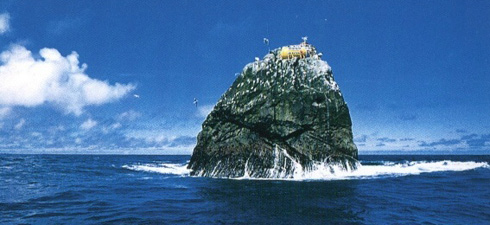Whether it is actually an island, or even a “phantom island”, is still debatable. And yet, for almost half a century four European countries have been exchanging blows in the form of resolutions, proclamations, even “invasions” in successive bids to annex it. Not so much for what it is, one of the most remote and godforsaken rocks in the world, but for what lies beneath it: oil. Rockallis a pyramid of volcanic granite that sticks up out of the stormiest patch of the Atlantic like the fin of a gargantuan shark. The sea is so tempestuous here that is almost impossible to determine the island’s height: somewhere between 20 and 30 metres above sea level, for a surface area of approximately 642 square metres.
Its location is firmly established – 57° 35' 48" north by 13° 41' 19" west – though its orientation remains uncertain due to the powerful magnetic radiation pervading the area. Rockall apparently emerged from the sea 55 million years ago, when the ancient supercontinent of Laurasia broke up and Europe and Greenland split up and drifted apart. It first appeared under the name of Rochol on a Portuguese map of 1550, but for at least two centuries was mistaken for Frisland, a mythical island posited by Venetian navigator Nicolò Zeno, and the equally mysterious island of Buss.
Whose rock is it anyway?
Others even claim it is a fragment of the mythical Kingdom of Hy-Brazil, the land of eternal youth that continually appeared and disappeared – as Rockall does when submerged by waves up to 30 metres high. The etymology of the name is not clear either: the English appellation Rockall could mean something like “roaring rock”, but it might also be named after Lieutenant Basil Hall, who was the first to note its discovery in 1881. All we know for sure is it is located 301.4 km west of the Scottish island of St Kilda, which is the closest land mass, and 424 km from Donegal, Ireland.
But whose rock is it anyway? Well, Britain claimed it in 1972, by act of Parliament in the name of Her Majesty the Queen, annexing it to the Isle of Harris, which is part of the Scottish County of Inverness. But that claim has not been officially recognised by any other state – and especially not by Ireland, Iceland and Denmark, which have similar expansionist designs on Rockall.
Rockall is a world heritage site, argues Greenpeace
Somebody ought to write a book about this turf war, which, administrative acts aside, is also a story of men – not only of the many men shipwrecked by Rockall, but also of the few who actually set foot on it. Starting with the three military men and naturalist James Fischer sent off from London to conquer Rockall in 1955, officially to prevent the Soviets from spying on the first British missile’s test flight from the Hebrides. That was followed by other – including some successful – attempts to perch atop the monolith, where not even a little lighthouse could withstand the stormy seas. An umpteenth expedition is currently in the works: British ex-serviceman Nick Hancock intends to set sail for Rockall in 2011, 200 years after its discovery, and stay there for two months.
As a matter of fact, though, these “forays” are more than just an exercise in heroism. TheUnited Nations Convention on the Law of the Sea stipulates that a rock can only be deemed an island if it can “sustain human habitation or an economic life of its own”. Otherwise it's just a rock and, as such, belongs to anyone and everyone. Rockall is a world heritage site, argues Greenpeace, which in 1997 “conquered” Rockall for 42 days, declaring it the sovereign “new global State of Waveland” to protest against deep-sea drilling for oil in the area. The environmentalists had rounded up Waveland citizens on the Internet from all over the world, but then the company sponsoring the initiative went bust.
The British have tried to inhabit this “roaring rock” to justify its annexation and, in so doing, exercise their own exclusive rights to exploit the fishing grounds, and especially the oil and mineral deposits, lurking in its depths. And of course to keep all the other candidates out. The negotiations between London, Copenhagen, Rejkjavik and Dublin remain wide open. But this free-for-all for Rockall may well be the last gasp of European imperialism.
Translated from the Italian by Eric Rosencrantz
Was this article useful? If so we are delighted!
It is freely available because we believe that the right to free and independent information is essential for democracy. But this right is not guaranteed forever, and independence comes at a cost. We need your support in order to continue publishing independent, multilingual news for all Europeans.
Discover our subscription offers and their exclusive benefits and become a member of our community now!












